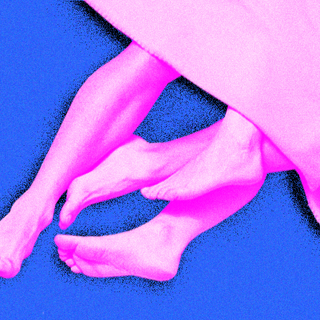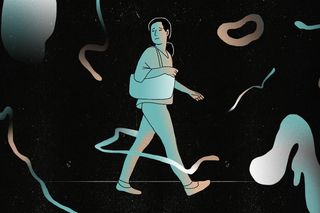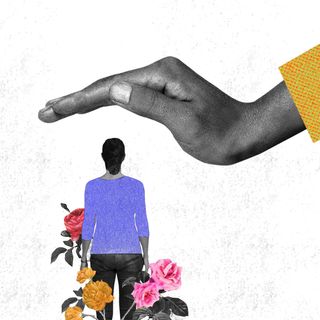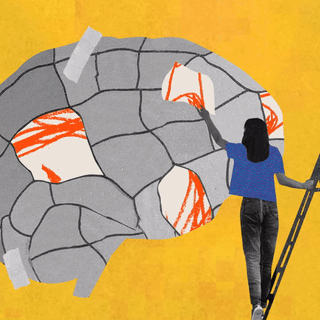
What It’s Like to Live With: Paranoid Schizophrenia
“I began seeing demonic apparitions in my roommate’s face, I could see zombies walking through the canteen on campus, I believed there was going be a terrorist attack on the premises.”

What It’s Like to Live With explores the stories of people who see and experience every day a little differently.
The article below mentions suicidal thoughts. In reading further, please keep in mind the content may cause emotional distress.
Two of my paternal aunts have paranoid schizophrenia, as does my maternal uncle — so, I’ve always been genetically predisposed to it. But it had seemed improbable for me to have it since unlike them, I’ve never really been withdrawn or reticent. I was always a friendly, outgoing person who got along with others. When I was 15, I was diagnosed with clinical depression though — as a result of living with fibromyalgia, which was excruciatingly painful and made me disengage socially. It also led me to be bullied in school. Eventually, I became reclusive. Then, when I was around 17 or 18, I was diagnosed with bipolar disorder and prescribed medication.
In 2013, when I was in the first year of my undergraduate course, I was diagnosed with paranoid schizophrenia with secondary depressive symptoms. I was 20 at the time. I was doing a journalism internship in a place with a rather toxic environment. At one point, I started to feel like people from work were following me back home, tracking my phone, getting cameras installed in my house… It was scary. But at home, nobody understood just how much I was suffering. They weren’t supportive of my feelings and didn’t get what I was going through. When I couldn’t deal with the fears I was living with anymore, I tried to kill myself. I remember being rushed to an emergency room.
I stayed at the hospital for about two-and-a-half months. I was treated using electroconvulsive therapy there. I was medicated too. Gradually, I recovered from the paranoia I was experiencing. I came back home, rejoined college in my second year, and completed my undergraduate degree. My dedication got me through post-graduation as well. The medicines I was — and still am — on allowed me to function, basically. The recommended dosage for me is really high, but without the medicines, I wouldn’t be functional, my doctors had concluded.
However, I started gaining a lot of weight — not just as a side-effect of the medication, but because of everything else my body had gone through as well. Having experienced body-shaming as a child, I grew up with body-image issues. So, when I began to weigh over 100 kilograms, I started looking for ways to lose weight. This is when I started seeing a naturopath, who suggested that I stop my medication. I did.
Related on The Swaddle:
‘Atrangi Re’ Attempts to Simplify Mental Health, but Ends Up Romanticizing It
Soon after, while I was away at my university doing a post-graduate diploma, I had a relapse — a very, very bad one. I began seeing demonic apparitions in my roommate’s face, I could see zombies walking through the canteen on campus, I believed there was going be a terrorist attack on the premises. Essentially, my hallucinations and delusions got quite bad.
Generally, it would take me like a year to recover from a relapse. But this time, since I was regularly in therapy, and my mother too had begun to understand my condition and extend her support, I was able to recover in just 50 days. But what I went through was so traumatizing that I’m still recovering from it — it’s 2022 now, and this happened in 2019.
Also, it’s not like I don’t experience any symptoms anymore — just that my medication prevents it from escalating. Sometimes, for example, I feel like someone — maybe, an underworld gang — is reading my thoughts and tracking everything that’s going on in my mind. Then, if I hear a sound outside — of a car reversing, for instance, or something else beeping somewhere — I feel these silent spectators are acknowledging my thoughts. My mind never stops making these connections, even though logically, I can understand they might not make sense.
What’s really unfortunate though is that despite having three degrees, I’ve not been able to achieve financial independence. I really want to find a workplace where I can disclose my condition and get reasonable accommodations — but it’s not an easy process. I’m looking for engaging work so I’m able to bring out the best in myself — or, at the very least, cover my personal expenses like therapy, which I can afford to have only once a month right now.
I’ve always desired to have a stable relationship and a partner too. My doctor had initially advised me against marriage — due to the stigma surrounding schizophrenia — but he told me that if I do want to go ahead, I must reveal my condition to potential matches and not simply cover things up like people often do with traditional marriages. My parents are looking for a match for me, but I don’t really know if I’ll find somebody who accepts my condition. I’m hopeful, but it’s going to be hard.
This interview has been condensed and edited for clarity. As told to Devrupa Rakshit.
Devrupa Rakshit is an Associate Editor at The Swaddle. She is a lawyer by education, a poet by accident, a painter by shaukh, and autistic by birth. You can find her on Instagram @devruparakshit.
Related


How Nurturing Touch Can Reduce Distress, Aid Recovery From Trauma
